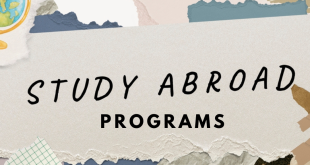Language learning plays a pivotal role when you study abroad, offering students numerous benefits and opportunities for personal and academic growth. As the world becomes increasingly interconnected, the ability to communicate effectively in multiple languages has become an invaluable skill. This article explores the significance of language learning when studying abroad, and highlights its impact on students’ educational experiences.
Table of Contents
The benefits of learning a language abroad
Studying abroad offers a wealth of benefits. And language learning significantly amplifies these advantages. Let’s explore some of the key benefits of language learning in the context of study abroad programs.
Enhancing Cultural Immersion and Understanding
Language and culture are inseparable. When students make the effort to learn the language of the host country, they also gain valuable insights into its customs, traditions, and way of life. Language learning allows students to go beyond surface-level interactions. They can engage in meaningful conversations with locals, participate in cultural events, and develop a genuine appreciation for the local culture. And this deeper cultural understanding enriches the study abroad experience and facilitates meaningful cross-cultural exchanges.
Facilitating Everyday Life and Communication
Learning the language of the host country is incredibly practical and helpful for everyday life during the study abroad period. It enables students to navigate through daily activities, such as grocery shopping, using public transportation, and seeking assistance when needed. Being able to communicate with locals in their own language fosters a sense of independence and makes the study abroad experience smoother and more enjoyable.
Academic Advantages
Language learning in study abroad programs offers significant academic advantages. It allows students to fully integrate into the educational system of the host country and take advantage of a broader range of academic opportunities. They can enroll in courses taught in the local language, participate in discussions, and engage with local professors and fellow students. This exposure to different educational approaches and perspectives enhances their academic growth and expands their knowledge in specific fields of study.
Building Confidence and Independence
Mastering a new language while studying abroad requires stepping out of one’s comfort zone. As students overcome language challenges, their confidence grows, enabling them to embrace new experiences and interact with locals more effectively. Language learning in study abroad programs fosters independence, as students navigate daily life and build resilience in unfamiliar environments.
Overcoming Language Barriers
Language barriers can be a significant hurdle when studying abroad. By learning the local language, students can overcome these barriers and navigate daily life more effectively. They can engage in conversations, seek help, and fully immerse themselves in the cultural context. Overcoming language barriers not only facilitates daily interactions but also creates opportunities for authentic cultural exchange and a deeper understanding of the host country’s society.
Developing Intercultural Competence
Language learning goes hand in hand with developing intercultural competence. By studying abroad and engaging with diverse cultures, students learn to appreciate differences and develop skills to navigate cross-cultural situations effectively. This intercultural competence is a valuable skill in today’s globalized world. In fact, it enables individuals to navigate diverse environments, work effectively in multicultural settings, and foster inclusive interactions.
Broadening Career Prospects
In today’s globalized world, proficiency in a foreign language significantly enhances professional opportunities and career advancement. Employers increasingly value individuals who can communicate and work in multicultural contexts. Language skills demonstrate adaptability, cross-cultural communication abilities, and a global mindset. By learning the language of the host country during a study abroad program, students enhance their marketability and increase their chances of securing international job opportunities.
Choose the Right Foreign Language Learning Institution Abroad
Language learning institutions play a crucial role in study abroad programs. These institutions provide comprehensive language courses tailored to the needs of international students. The best of them have experienced instructors using immersive teaching methods and aim to create a supportive environment where students can enhance their language skills and develop a deeper appreciation for the host country’s culture.
To weigh up all your options and find the right language school abroad for your language learning project, here are a few steps to follow:
Look for Program Accreditation and Quality
Ensure that the language program you choose is accredited by reputable organizations. Look for accreditation from recognized bodies such as the Accrediting Council for Continuing Education and Training (ACCET), the British Council, or national language learning associations. Accreditation ensures that the program meets quality standards and offers a structured curriculum.
Read Student Reviews and Testimonials
Research student reviews and testimonials about the language programs you’re interested in. Check online platforms, forums, and social media groups where students share their experiences. Pay attention to feedback regarding the program’s teaching quality, student support, cultural activities, and overall satisfaction.
Check the Program Duration and Flexibility
Consider the duration and flexibility of the language program. Some programs offer short-term options, such as summer or intensive courses, while others provide semester-long or year-long programs. Assess the program’s schedule and ensure it aligns with your availability and other commitments.
Evaluate the Program Curriculum and Teaching Methods
Examine the program’s curriculum and teaching methods. Look for a well-rounded curriculum that focuses on the four language skills: listening, speaking, reading, and writing. Inquire about the teaching methods employed, such as communicative approaches, interactive exercises, and cultural components. Ensure that the program emphasizes practical language use and encourages student engagement.
Consider if there are any Support Services and Cultural Activities
Evaluate the support services offered by the language program. Check if they provide assistance with accommodations, visa procedures, and local orientation. Additionally, inquire about cultural activities, excursions, and opportunities for language practice outside the classroom. A program that offers a well-rounded experience, both academically and culturally, can enhance your language learning journey.
Assess the Program Costs
Last but not least, consider the cost of the language program. This includes tuition fees, program material, and any additional fees. Compare the costs of different programs and assess their value for money. Additionally, inquire about scholarships, grants, or financial aid options that may be available to help alleviate the financial burden. You can also check with your universities, as some of them offer language learning in the institution for free.
Some Resources to Check
Here are some resources you can read to find out foreign language learning programs on our website:
- Dutch language learning in the Netherlands
- German language learning in Austria, in Germany, or in Switzerland
- Learn Japanese abroad in Japan
- Learn Korean abroad
- Portuguese Language Learning in Brazil
- Spanish courses abroad in Argentina
How Can I Learn a Language while Studying Abroad: A Few Tips
To make the most of language learning during a study abroad program, consider the following tips:
Start before you leave your home country
Before you even leave home for your study destination, you can start to immerse yourself in the language you wish to learn. Even if you don’t have time to seriously learn yet, you can familiarize yourself listening to the language through podcasts, movies, TV shows, audiobooks… It’s a proactive way to get your ears used to the words and intonations early.
Set language learning goals
Once you’ve decided on which language school and learning method you prefer, define clear goals. But make it smart and realistic, so you don’t take the risk of getting frustrated if it doesn’t go fast enough for you. You can define criteria such as reaching a certain proficiency level or mastering specific skills.
Practice constantly, whenever and wherever you can
Consistency is key to language acquisition. So whenever and wherever you can, embrace opportunities to use the language, and practice what you’ve learned. Don’t be shy, even if you feel unsure or make mistakes, and don’t hesitate to ask people to correct you. More importantly, don’t be shy! Part of the reasons you’re learning the language is to interact with people and what better setting than to do it on your way to or back to school, for example.
Memorize phrases and keep a language learning journal
Again, don’t underestimate the power of consistency in your language learning journey! Even if you’re taking in-class courses, take advantage of language-learning apps, online resources, and language exchange platforms. These tools provide interactive exercises and vocabulary practice, so you can memorize common phrases or words you can use in the future. Keep a language learning journal you can pull at the end of your day for a quick review.
Get a language learning buddy
Don’t fall into the trap of believing that you first need a high level of proficiency before practicing with others. The truth is, the sooner you immerse yourself in conversation, the faster you’ll attain the desired results. And by actively practicing the language, not only you’ll accelerate your progress but also get familiar with its everyday nuances. And one of the best way to do so is to get a language learning buddy abroad. To do so, check your university or city to find out if there are any exchange clubs. Also, leverage the power of technology by using apps such as Tandem to find language pairs.
Engage with locals by combining the language learning abroad with your favorite hobbies
Another way to daunt the frustration if you feel you don’t progress fast enough is to find ways to make the language learning process interesting. And to do so, engage in your favorite hobbies or leisure in the language you’re trying to master: find a gym, take a cooking class, a dance class, play soccer with the locals, whatever you like to do, use it as a means to interact with locals. Every minute you spend is a minute of progress in your language learning process.
Conclusion
Language learning is an integral part of the study abroad experience. It facilitates communication, fosters cultural understanding, enhances academic engagement, and boosts personal growth. By taking the time to learn the local language, students can fully immerse themselves in the host country’s culture, forge meaningful connections, and navigate daily life with ease. Moreover, language learning opens doors to a wider range of academic opportunities and enriches the overall educational experience. So, for students planning to study abroad, embracing the challenge of learning the local language will undoubtedly enhance their journey. But more importantly, it will leave a lasting impact, personally and professionally beyond their studies.
This post is also available in ar.




 Aljawaz Your guide to study abroad
Aljawaz Your guide to study abroad
















